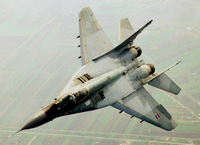Russia's foreign arms sales recently had another banner year, breaking all post-Soviet records, causing Moscow policymakers to celebrate. Meeting with the Commission for Military-Technical Cooperation with Foreign States on Feb. 10, President Dmitry Medvedev reported that the value of Russian weapons exports in 2008 exceeded $8.35 billion, up from $7.4 billion in 2007, also a record. On Feb. 12, Alexander Fomin, deputy director of the Federal Service on Military-Technical Cooperation, said that Russia planned to export $8.5 billion of arms in 2009. On Feb. 16, Nikolai Dimidyuk, special programs director for Rosoboronexport, Russia's arms export monopoly, announced that the company had $20 billion worth of foreign orders in its portfolio, mostly from India and China. Yet, there are abundant signs of trouble ahead for Russia's defense industry. The global financial crisis threatens to deprive foreign governments of funds for future arms imports, curtailing future Russian sales. The declining value of Russia's oil and gas exports, which provides much state revenue, has called into question the government's ability to sustain its own military procurement, modernization, and reform plans as well as its non-defense goals. The current emergency came at a particularly inopportune moment. The Russian Defense Ministry has recently begun drafting a new arms procurement program for 2011-2020, which it will submit to the Russian parliament for approval by March 2010. According to ministry sources, the current 5 trillion ruble program (approximately $150 billion) for 2006-2015, announced with great fanfare a few years ago, has fallen significantly behind schedule. As a result, it failed to equip the Russian military with the most sophisticated weapons, forcing the armed forces to rely on aging Soviet-era systems of decreasing effectiveness.
Global Insights: Trouble Ahead for Russia’s Defense Industry

